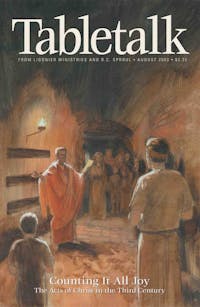
Request your free, three-month trial to Tabletalk magazine. You’ll receive the print issue monthly and gain immediate digital access to decades of archives. This trial is risk-free. No credit card required.
Try Tabletalk NowAlready receive Tabletalk magazine every month?
Verify your email address to gain unlimited access.
It has been said that many moderns suffer from a malady known as “fromlessness.” In our fast-moving, transient society, people have lost a sense of their roots. They are disconnected from their history. This is especially true in the United States. We are a people who have become disconnected from our history and heritage. For many of us, knowledge of our Christian heritage extends back no further than the origins of our own local church or particular denomination.
It is becoming increasingly evident that this historical ignorance is an unacceptable state of affairs that leads to theological naiveté and hermeneutical chaos. But there is some evidence that this unfortunate situation is changing as more and more evangelicals come to appreciate the same things their Reformation forefathers appreciated—the theological and exegetical work of the early church fathers.
For those who are interested in studying the thought of the early church, there is no better introduction than Early Christian Doctrines by J.N.D. Kelly. The book combines chronological and topical approaches as a means to survey the vast amount of available information in the clearest manner possible.
In Part One, Kelly provides the reader with introductory materials that lay the foundation for all that follows. In chapter 1, he discusses the religious and philosophical context in which the early fathers lived and wrote. He continues in chapter 2 with a discussion of the way in which the early church understood the relationship between Scripture and tradition. This chapter includes a good introduction to the idea of the rule of faith as developed by Irenaeus and Tertullian. The third chapter discusses the nature of Scripture and Biblical interpretation in more detail. Kelly explores early developing concepts of the canon, as well as doctrines of inspiration. He also notes the conflict between the Antiochenes and Alexandrians regarding methods of interpreting Scripture.
Part Two covers the ante-Nicene period of the early church (the first century to the Council of Nicea in a.d. 325). Kelly chooses to approach this period in a topical manner. Chapters 4 and 5 discuss the development of the doctrine of the Trinity. Chapter 6 covers the development of the doctrine of Christology. Chapter 7 examines the doctrine of man and redemption, and chapter 8 discusses the doctrine of the church.
Part Three is more extensive, covering a wider range of topics as they developed between the councils of Nicea and Chalcedon. In addition to continuing discussions of the subjects covered in Part Two, attention is also paid to Nicea and Chalcedon and their doctrinal conclusions, the Pelagian controversy, and the sacraments. In an epilogue, Kelly includes chapters that discuss eschatology and Mariology.
Kelly’s book has numerous strengths. It surveys a vast amount of material in a concise and readable manner without being shallow. Kelly demonstrates an intimate knowledge of the primary and secondary sources. His discussions of the development of Trinitarian and Christological doctrine are particularly strong, as is his discussion of the early development of sacramental theology. Kelly’s discussion of the sacraments is surprisingly fair and irenic considering the amount of controversy that has surrounded this issue.
The book’s major feature is its one unavoidable weakness. Any author who decides to survey such a large amount of material must necessarily limit his discussion of each topic. So while the book offers excellent introductory surveys of the early church’s thinking on a large number of topics, it cannot go into great detail on any one of them. Throughout most of the book, Kelly manages to walk the fine line between conciseness and incompleteness, but there are two sections of the book that could use further expansion. First, Kelly’s discussion of the relationship between Scripture and tradition in the early church should be supplemented with the research of men such as Heiko A. Oberman, Jaroslav Pelikan, and others on the subject. Second, Kelly’s chapter on the development of Marian doctrine in the early church is also inadequate. Considering the amount of attention given to Mariology by the Roman Catholic Church in the nineteenth and twentieth centuries, a much more thorough study of the place of Mary in patristic thought would have been extremely valuable.
Early Christian Doctrines, published by HarperSanFrancisco, is an indispensable resource that should be read by all who are interested in coming to a better understanding of their Christian heritage and history. It is sheer arrogance to discount the wisdom of our forefathers in the faith. The Reformers knew this and intently studied the theology and exegesis of the early church fathers. If we believe in the communion of the saints, we simply cannot ignore the contributions of those who happen to have come before us.
